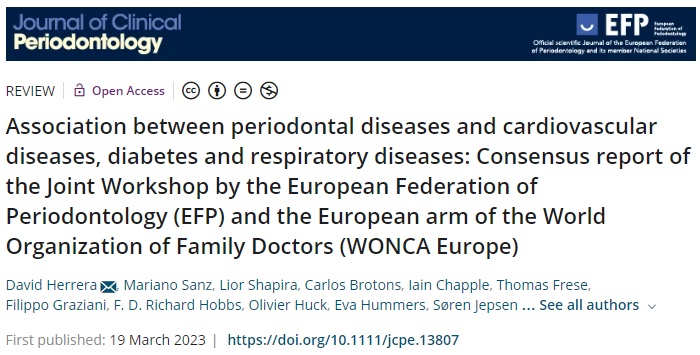Association between periodontal diseases and cardiovascular diseases, diabetes and respiratory diseases: Consensus report of the Joint Workshop of the European Federation of Periodontology (EFP) and the European arm of the World Organization of Family Physicians (WONCA Europe)
Highlights
|
Periodontitis is characterized by the progressive destruction of the tooth’s supporting apparatus (periodontium), the main characteristics being the loss of attachment and alveolar bone, the presence of periodontal pockets and bleeding on probing. It is initiated by the accumulation of bacterial biofilms on and below the gingival margin, which activates the host’s immunoinflammatory response. The latter drives dysbiosis within the oral biofilm, triggering a dysregulation of immunoinflammatory processes and ultimately resulting in the destruction of periodontal tissue.
Periodontitis is an important public health problem due to its high prevalence, being the most common chronic inflammatory non-communicable disease (NCD) in humans.
According to data from the Global Burden of Disease (GBD) database, there were 1.1 billion cases of severe periodontitis worldwide in 2019, an increase of 8.44% (95% confidence interval [CI]: 6). .62%–10.59%) in age. A standardized prevalence rate of severe periodontitis was observed between 1990 and 2019. Periodontitis also presents a significant public health burden due to associated morbidity, leading to disability due to impaired masticatory function, speech and aesthetics or edentulism. It is a source of social inequality, significantly impairs quality of life, has a negative impact on general health, and is associated with significant medical and dental care costs.
Periodontitis has been associated with a variety of systemic diseases, including diabetes, cardiovascular diseases, and respiratory diseases. It is also independently associated with premature death from all causes or CVD, particularly in multimorbid populations, where the impact of periodontitis is equivalent to having comorbid diabetes mellitus. Periodontitis also results in increased medical expenses.
Diabetes is a highly prevalent NCD, with a global prevalence estimated at 9.3% (463 million people), and expected to increase to 10.2% (578 million) by 2030 and 10.9% (700 million) by 2045. Type 2 diabetes is one of the main causes of disability and premature mortality, mainly due to vascular and kidney complications. The reported bidirectional association with periodontitis was jointly explored at the European Federation of Periodontology (EFP) and International Diabetes Federation (IDF) Focused Workshop in 2017.
CVD comprises a large and diverse group of different pathologies, including ischemic heart disease, stroke, hypertension, rheumatic heart disease, cardiomyopathies, and atrial fibrillation. CVD is the leading cause of mortality worldwide, accounting for 32% of all deaths globally (World Health Organization, 2021) and 45% of NCD-related mortality. The reported association with periodontitis was explored in a joint EFP and World Heart Federation (WHF) focused workshop in 2019.
Respiratory diseases, including chronic (chronic obstructive pulmonary disease [COPD], asthma, obstructive sleep apnea [OSA]) and acute (community-acquired pneumonia [CAP], COVID-19), are highly prevalent diseases. In 2019, lower respiratory tract infections and COPD were among the top 10 diseases causing long-term disabilities (GBD 2019 Diseases and Injuries Collaborators, 2020), which had a significant impact on public health. In fact, 251 million patients worldwide were diagnosed with COPD in 2016 and it is expected to become the third leading cause of mortality by 2030 (GBD 2015 Chronic Respiratory Disease Collaborators, 2017).
In the previous EFP Focused Workshops on the association between periodontitis and diabetes (2017) and CVD (2019), the crucial role of family doctors in the implications of these associations was clearly established. Therefore, a third focused workshop was designed together with the European arm of the World Organization of National Colleges, Academies and Academic Associations of General Practitioners/Family Practitioners (WONCA Europe), with the aim of exploring (1) the implications for dentists and family physicians of the associations between periodontal and systemic diseases and (2) the role of oral health professionals (OHPs) who collaborate with family physicians in the management of NCDs and the promotion of lifestyles healthy life.
Goals
To explore the implications for dentists and family physicians of the association between periodontal and systemic diseases and the role of dentists and family physicians in the management of non-communicable diseases (NCDs) and the promotion of healthy lifestyles.
Materials and methods
Consensus reports from previous focused workshops on the associations between periodontitis and diabetes (2017) and periodontitis and cardiovascular diseases (2019) formed the technical reviews to support discussions on both topics. For the association with respiratory diseases, a systematic review was specifically commissioned for Workshop discussions. The working groups prepared proposals independently, and then the proposals were discussed and approved in plenary meetings.
Results
Periodontitis is independently associated with cardiovascular disease, diabetes, chronic obstructive pulmonary disease (COPD), obstructive sleep apnea, and complications of COVID-19 .
Dentists and family doctors must collaborate in the management of NCDs, implementing strategies for the early detection of periodontitis in primary care centers and of cardiovascular diseases or diabetes in the dental field.
Family doctors should be informed about periodontal diseases and their consequences, and oral health professionals (OHPs) should be informed about the relevance of NCDs and associated risk factors.
Conclusions
Closer collaboration between OHPs and family physicians is important in the early detection and treatment of NCDs and in the promotion of healthy lifestyles. Pathways for early detection of periodontitis cases in family medicine practices and of NCDs in dental practices should be developed and evaluated.
Clinical relevance
Scientific justification of the study
Closer collaboration between oral health professionals (OHPs) and family doctors is important in early case detection and treatment of non-communicable diseases (NCDs) (including cardiovascular diseases, diabetes, respiratory diseases and periodontitis) and in the promotion of lifestyles
Main findings:
Periodontitis is independently associated with cardiovascular disease, diabetes, chronic obstructive pulmonary disease, obstructive sleep apnea, and complications associated with COVID-19, and treatment of periodontitis is associated with improvements in systemic health.
Practical implications:
Strategies for early detection/prevention of NCD cases, including periodontitis, should be developed for family physicians, OHPs, and healthcare payers. Evidence-based information on reported associations between periodontitis and other NCDs should be made available to family physicians, OHPs, healthcare payers, patients, and the general population.

















